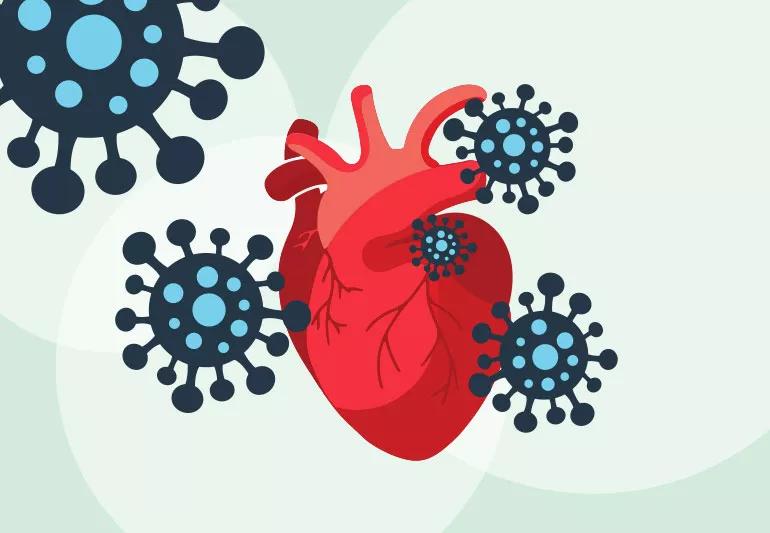Study points to possible long-term effects of the heart, even in the young & healthy

Image content: This image is available to view online.
View image online (https://assets.clevelandclinic.org/transform/3a3ab670-a7c0-4827-83e8-d808db397440/coronaHeart-1213679775-770x533-1_jpg)
Coronavirus attacking heart
Although coronavirus (COVID-19) is largely an illness of the lungs and respiratory system, research is now suggesting that the virus can cause quite a bit of damage to the heart and cardiovascular system.
Advertisement
Cleveland Clinic is a non-profit academic medical center. Advertising on our site helps support our mission. We do not endorse non-Cleveland Clinic products or services. Policy
From the beginning of the pandemic, experts acknowledged that older adults and people with underlying health conditions, like heart disease, were at higher risk for developing COVID-19 (and all of the complications that come along with it). But now, early evidence suggests that heart abnormalities may be present in patients who didn’t experience a severe case of COVID-19 or who didn’t have any preexisting conditions.
The study examined and compared the hearts of 100 patients – some who had previously recovered from COVID-19 and others who never had the virus. Experts performed a heart MRI on each patient, which is a type of test that examines the structure and function of the cardiovascular system. It’s often used to assess the heart after a heart attack or stroke and can identify abnormalities, damage or inflammation.
The findings were sobering, as 78% of patients who previously had the virus showed structural changes or damage to their hearts, including inflammation and scarring.
Some of the COVID-19 patients had previously existing heart conditions, but even more mystifying was the fact that some patients with heart damage were relatively young, healthy and had no history of underlying risk factors.
Advertisement
“We should think of this cross-sectional study as a single snap shot in time, so we don’t know if any of these abnormalities were present before COVID-19,” says cardiologist Paul Cremer, MD, who did not take part in the study. “This research is certainly impactful and hints at possible damage to the heart, even when cardiac function is normal, but it primarily highlights the need for more research on the long-term effects of COVID-19.”
We know that COVID-19 can cause extreme inflammation throughout the body, particularly in the heart. As a consequence of the high inflammation, oxygen and blood flow to the heart muscle can be decreased. This stress makes the heart work harder to pump blood throughout the body as it’s trying to fight the infection.
Massive levels of inflammation can trigger your body into something that doctors call a “cytokine storm,” in which the immune system basically overreacts and your immune cells start injuring healthy cells, further spurring the inflammation.
Some research suggest that COVID-19 can also directly infect and invade the cells in the cardiovascular system.
Maintaining a heart-healthy diet and exercise program is now more important than ever, says Dr. Cremer. Just because we’re in a pandemic does not mean we can lose sight of taking care of ourselves, especially our hearts. This also means not smoking, controlling our weight and stress levels and seeking medical care if we have a personal or family history of heart disease.
And when it comes to protecting yourself against COVID-19, it bears repeating what you’ve been hearing over the past several months: wash your hands, don’t touch your face, practice social distancing, wear a face mask and stay home when you’re sick.
Together we can slow the spread of the virus and help protect each other.
Advertisement

Delivered every Tuesday!
Sign up for our Health Essentials emails for expert guidance on nutrition, fitness, sleep, skin care and more
It's a letter about the news!

Every two weeks once
Sign up for our Health Essentials emails for expert guidance on nutrition, fitness, sleep, skin care and more.
Learn more about our editorial process.
Advertisement
The short answer: It’s complicated, but the basic care precautions still prevail, like washing your hands and isolating if you’re sick
They can feel like a typical headache or a migraine headache, but the pain can last for weeks to months
Any large social gathering — from a family birthday party to an indoor music concert — has the potential to spread serious infection
It’s important to connect with a healthcare provider, get quality sleep and balance your activities with your energy levels
Just like the flu, COVID-19 will continue to evolve every year
The duration varies, but symptoms can linger for a few days up to a couple weeks or more
Vaccination is best for prevention, but if you get sick with COVID-19, treatments are available
The virus lives best in humans, but it can last on hard surfaces, like doorknobs and railings
Type 2 diabetes isn’t inevitable with these dietary changes
Applying a hot or cold compress can help with pain
Pump up your iron intake with foods like tuna, tofu and turkey